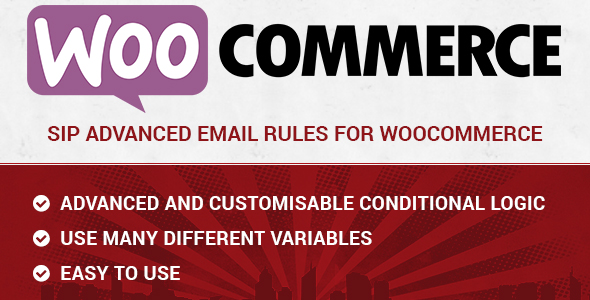SIP Advanced Email Rules For WooCommerce Wordpress Plugin - Rating, Reviews, Demo & Download

Plugin Description
With SIP Advanced Email Rules you can create follow-up emails for your customers based on any criteria you want. You can set advanced and customizable conditional logic for sending an email. There are no any restrictions on targeting emails for your customers. You can set multiple targets at a time.
There are multiple options available to send with email. You can use coupon option to set coupon details and many different variables in an email. You can finally have the flexibility to send targeted emails to your customers based on advanced criteria, never send manual emails again!
Minimum Requirements:
– WordPress 4.1 or greater.
– WooCommerce 2.4.0 or greater.
Installation:
– Step1: Click on Plugins and then click on Add New.
– Step2: Search for “SIP Advanced Email Rules for WooCommerce†in the Search for plugins box. Check it for developer Shopitpress.
– Step3: Click install now to install the SIP Advanced Email Rules for WooCommerce Plugin. After the installation is completed. Click on the activate plugin to activate it. This completes the installation.
Advanced Email conditions:
– Cart.
1) Subtotal: Set cart subtotal here with a condition. For example “subtotal†“Not equal to†“90â€, that means the email will be sent only if cart subtotal is not equal to 90.
2) Subtotal ex. taxes: For example “Subtotal ex. taxes†“equals to†“90â€, that means the email will be sent only if cart subtotal ex. taxes is equal to 90.
3) Tax: Set condition with applying tax amount here. For example, “tax amount†“Greater or equal to†“90â€, that means the email will be sent only if cart tax amount is greater or equal to 90.
4) Day of the week: You can set condition here to send an email on the particular day of the week. For example, “Day of the week†“Exactly Match†“Sundayâ€, that means the email will be sent only if a day of the week is Sunday.
5) Quantity: For example. If Quantity “equals to†10, that means the email will be sent only if total cart quantity is equaled to 10.
6) Contains Product: Set Product name in condition here. For example, “Contains Product†“Exactly Match†“Product Nameâ€, that means the email will be sent only if contains product is same in the cart.
7) Coupon: Set coupon code here. For example “Coupon†“Contains†“OFFER20â€. Here OFFER20 is a coupon code, that means the email will be sent only if coupon code Contains OFFER20.
 Weight: Set weight of total cart here. For example “Weight†“Greater or equal to†“100â€, that means the email will be sent only if cart total weight is greater or equal 100.
Weight: Set weight of total cart here. For example “Weight†“Greater or equal to†“100â€, that means the email will be sent only if cart total weight is greater or equal 100.
9) Shipping Class: For example “Shipping Class†“Exactly match†“Bulky Goodsâ€, that means the email will be sent only if shipping class is set to Bulky Goods in selected product.
10) Shipping Method: Select shipping method here from available options. For example “Shipping Methods “Exactly Match†“Flat Rateâ€, that means the email will be sent only if shipping methods is set to Flat rate.
11) Payment Method: For example, “Payment Method†“Exactly Match†“Direct Bank Transferâ€, that means the email will be sent only if the payment method is matched during checkout.
12) Custom Field: You can set here any variable name with compare value. For example, “Custom Field†“Exactly Match†“Variable_name, Compare Valueâ€, that means the email will be sent only if product exists with selected variable name with the value.
– User
1) Zipcode: For example, “Zipcode†“Does not contain†“12345â€, that means the email will be sent only if a user is not located in that particular zip code.
2) Shipping Zipcode: For example, “Shipping Zipcode†“Exactly match†“12345â€, that means the email will be sent only if shipping is exactly matched with selected zip code number.
3) City: For example, “City†“Exactly match†“New Yorkâ€, that means the email will be sent only if a user is purchased the product from New York City.
4) Shipping City: For example, “Shipping City†“Exactly match†“New Yorkâ€, that means the email will be sent only if shipping is exactly matched with selected City.
5) State: For example, “State†“Does not contain†“Alaskaâ€, that means the email will be sent only if a user is not located in that particular State.
6) Shipping State: For example, “Shipping State†“Exactly match†“Alaskaâ€, that means the email will be sent only if shipping is exactly matched with selected State.
7) Country: For example, “Country†“Does not contain†“United Statesâ€, that means the email will be sent only if a user is not located in that particular Country.
 Shipping Country: For example, “Shipping Country†“Exactly match†“United Statesâ€, that means the email will be sent only if shipping is exactly matched with selected Country.
Shipping Country: For example, “Shipping Country†“Exactly match†“United Statesâ€, that means the email will be sent only if shipping is exactly matched with selected Country.
9) User Role: This rule is applied for logging user. For example “User Role†“Exactly Match†“Subscriberâ€, that means the email will be sent only if a user is registered as a subscriber.
10) Email: For example “Email†“Exactly Match†“user@gmail.comâ€, that means the email will be sent only if a user is registered with this email id.
11) Custom Field: You can set here any variable name with compare value. For example, “Custom Field†“Exactly Match†“Variable_name, Compare Valueâ€, that means the email will be sent only if User exists with selected variable name with the value.
– Product
1) Width: For example “Width†“equals to†“200â€, that means the email will be sent only if Width of a product is equal to 200.
2) Height: For example “Height†“Not equals to†“150â€, that means the email will be sent only if Height of a product is other than 150.
3) Length: For example “Length†“Greater or equals to†“50â€, that means the email will be sent only if Length of a product is greater or equal to 50.
4) Stock: For example “Stock†“Less or equals to†“5â€, that means the email will be sent only if Stock of a product is Less or equal to 5.
5) Stock Status: For example “Stock Status†“Exactly Match†“In stockâ€, that means the email will be sent only if the product is available in stock.
6) Category: Here categories of product will be displayed in the dropdown. For Example “Category†“Contains†“Albumsâ€, that means the email will be sent only if the product is available in this category.
7) SKU: For Example “SKU†“Exactly Match†“#123â€, that means the email will be sent only if the product is exists with selected SKU.
Custom Field: You can set here any variable name with compare value. For example, “Custom Field†“Exactly Match†“Variable_name, Compare Valueâ€, that means the email will be sent only if Product exists with selected variable name with a value.
You can set those rules with different conditions like Equal to, Not equal to, Greater or equal to, less or equal to using a group as well.
There is two more option available with AND condition to set a status of order.
Emails:
– You can set flexible email content with setting appropriate time to send an email to your customers. You can set flexible email content with setting appropriate conditions to send an email to your customers.You are allowed to use the shortcode and different variable inside the content area. There are variables listed below to understand its purpose to use.
1) {{customer_first_name}} : The first name of customer
2) {{customer_last_name}} : The last name of customer
3) {{store_url}} : The url of shop page of WooCommerce
4) {{store_name}} : The name of blog
5) {{order_number}} : The order number
6) {{order_url}} : The url of order view
7) {{order_items}} : List of order item with link and name.
 {{order_items_with_thumbnail}} : List of order item with name and thumbnail
{{order_items_with_thumbnail}} : List of order item with name and thumbnail
9) {{tracking}} : Tracking of the order (requires aftership plugin)
10) {{coupon1.code}}, {{coupon2.code}} : send multiple coupon
Coupon option
1) Enable coupon for this follow-up email rule: Enable or disable coupon for this follow-up email rule.
2) Coupon Name: Set coupon name.
3) Coupon expiry date: set coupon expiry date.
4) Coupon type: Set coupon type here in Amount or Percentage.
5) Apply before tax: If checked, the coupon should apply before calculating tax.
6) Individual use: If checked, the coupon can not be used in with another coupon.
7) Enable free shipping: If checked, the coupon can enable free-shipping.
Uninstalling:
Uninstalling the plugin is straightforward like any other WordPress plugin.
Step1: Click on Plugins >> Installed Plugins to see the list of installed plugins. Now click on the Deactivate plugin to deactivate it first.
Note: Remove all the shortcodes in all the pages / posts that are generated by this plugin, as after the plugin is removed. The code will be displayed on a front end, which will not look good on the front end of the website, where your visitors view pages.
Step2: After deactivating the plugin,you can see the option to delete the plugin, click on delete link to remove the plugin from your WordPress. Now the plugin is removed.



